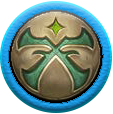There is a Legacy version
here.

Tengu
 Uncommon Humanoid Tengu Source Player Core 2 pg. 33PFS Note
Uncommon Humanoid Tengu Source Player Core 2 pg. 33PFS Note All Pathfinder agents have access to the tengu ancestry
Tengus are gregarious and resourceful avian humanoids who collect knowledge and treasures alike.Tengu are survivalists and conversationalists, equally at home living off the wilderness and finding a niche in dense cities. They accumulate knowledge, tools, and companions, adding them to their collection as they travel.
The tengu diaspora has spread across Golarion in search of a better life, bringing their skill with blade crafting to lands far from their home. In maritime regions, tengu notably work as fishers, blacksmiths, and “jinx eaters”— members of ships' crews who are believed, accurately or otherwise, to absorb misfortune. Having lived in a variety of conditions and locations, tengu tend to be nonjudgmental, though their willingness to associate with lawbreakers has often led some to regard them with suspicion.
If you want to play a character hailing from a rich history of artisanship and tradition, but who happily picks up new practices as needed, you should play a tengu.
You Might...
- Be gregarious and eager to find a flock of your own.
- Voraciously absorb the practices of those around you, sometimes even forgetting where they came from.
Others Probably...
- Get confused by your simultaneous respect for and disregard of tradition.
- Have trouble reading your expressions or regard you with suspicion and superstition.
Physical Description
Tengu have many avian characteristics. Their faces are tipped with sharp beaks and their scaled forearms and lower legs end in talons. As closed footwear tends to fit poorly unless custom made, many tengu wear open sandals or simply go barefoot. Tengu are rarely more than 5 feet tall, and they are even lighter than their smaller frames would suggest, as they have hollow bones. A small number of tengu have vestigial wings.
Society
The greatest divide in tengu society is between tengu remaining in their ancestral home and those who have dispersed across the world. Tengu refer to these two groups as those “in the roost” and those “migrating,” respectively. Roosted tengu tend to be more traditionalist and conservative and are especially concerned with preserving their culture in the face of years of erosion from oppression. Migrating tengu, on the other hand, voraciously absorb the culture of the various nations and settlements that they now call home.
Beliefs
Tengu often follow the faith of the region in which they were raised, though the tengu ancestral deity is the storm god
Hei Feng. Before their diaspora, tengu practiced a syncretic faith that blended a polytheistic worship of the deities responsible for creating the natural world. As tengu folklore posits that tengu long ago descended from the night sky on shooting stars to rest upon Golarion's highest peaks, animist rites were practiced on mountains and other great natural features.
Popular Edicts protect tengu traditions, adopt the lessons of other cultures, seek out natural wonders
Popular Anathema lose control of your emotions
Names
Roosted tengu tend toward more traditional names, while migrating tengu readily absorb and repurpose the culture of those around them.
Sample Names
Arkkak, Chuko, Dolgra, Dorodara, Kakkariel, Kora, Marrak, Mossarah, Pularrka, Rarorel, Ruk, Tak-Tak, Tsukotarra
Tengu Mechanics
Hit Points
6
Size
Medium
Speed
25 feet
Attribute Boosts
Dexterity
Free
Languages
CommonTenguAdditional languages equal to your Intelligence modifier (if positive). Choose from
Dwarven,
Elven,
Halfling,
Gnomish,
Goblin,
Fey, and any other languages to which you have access (such as the languages prevalent in your region).
You can see in
dim light as though it were
bright light, so you ignore the
concealed condition due to dim light.
Sharp Beak
With your sharp beak, you are never without a weapon. You have a beak
unarmed attack that deals 1d6 piercing damage. Your beak is in the
brawling weapon group and has the
finesse and
unarmed traits.